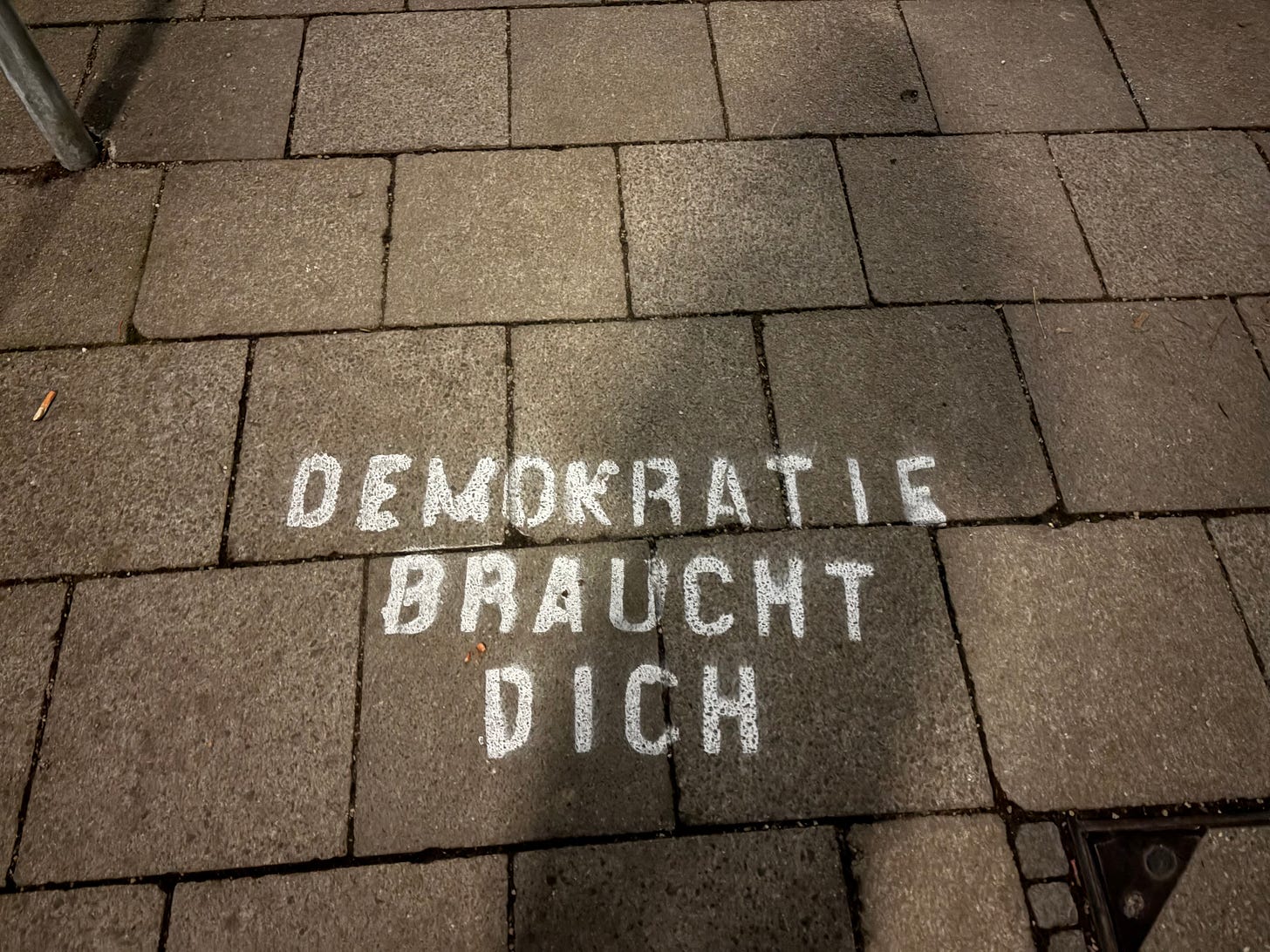Tomorrow, Germans Vote. I Won’t.
And they have 29 political parties to choose from.
In all general elections, Germans have two votes. Tomorrow, I could choose from twenty-nine political parties, representing a vast range of ideas, opinions, and strategies for Germany’s future. Some are serious contenders for power. Others are more… niche. The Garden Party, for example, advocates for more greenery in cities, fresh homegrown vegetables, and colorful flowers in every garden. The Party for Rejuvenation Research has a singular goal: reversing the aging process for everyone—an issue of particular importance in Germany’s rapidly aging society. Then there’s the V-Party³—not the tomato juice, but the world’s only political party where vegans and vegetarians can find a political home. The Cannabis Social Club requires no explanation.
If I were voting, I would have to make a choice.
To make sense of it all, I took a test. Since 2002, the Federal Agency for Civic Education (Bundeszentrale für politische Bildung, or bpb) has asked every political party on the ballot to state their position on roughly twenty key issues. This year, topics ranged from support for the war in Ukraine and closing Germany’s borders to asylum seekers to implementing a speed limit on the Autobahns and raising the minimum wage to 15 euros. Anyone can take the Wahl-O-Mat, though, interestingly, it’s only available in German. Like a record 21.5 million Germans—about half the eligible electorate—I turned to the machine for guidance. I can’t imagine anyone was more surprised by their result than I was.
My match? A party I had heard of maybe once in college. The South Schleswig Voters' Association, or Südschleswigscher Wählerverband (SSW)—a real tongue-twister in German—is a regional political party representing Frisian and Danish minorities in Germany’s northernmost state. At one point, it even wanted Schleswig-Holstein to leave Germany and become part of Denmark. In the last general election, it won a grand total of 0.1% of the vote. Don’t get me wrong—I have great respect for the people of the north. I love their beaches, towns, and horses. But I am neither Frisian nor Danish, and I think the last thing Germany needs right now is a state trying to secede from the Union.
Like most people, I would cast my two votes strategically. In the German electoral process, this can be quite the complicated affair. Historically, only the top seven political parties on the ballot make it into parliament—they need to surpass the 5% threshold of the total vote. Neither the Garden Party, the Rejuvenation Party, the V³, nor my SSW have ever made it. This year, the most likely parties to enter parliament are:
Christian Democratic Union (CDU) – conservative, polling at 30% (up 10% from the 2021 election)
Alternative for Germany (AfD) – right-wing extremist, polling at 20% (up 10%)
Social Democratic Party (SPD) – center-left, polling at 14-15% (down 10%)
The Greens (Bündnis 90/Die Grünen) – polling at 12% (roughly unchanged)
Free Democratic Party (FDP) – pro-business, polling at 4.5% (down 10%)
The Left (Die Linke) – polling at 7.5% (up 4%)
Now, cast your two votes.
Your first vote goes to a candidate from your district—simple if you know her personally, less so if you don’t like what you know. Your second vote goes to your preferred party. Each party has a list of candidates, and the more votes they receive, the more people from that list are sent to Berlin.
According to the latest polls—remarkably reliable compared to those in the U.S.—Germans seem ready to move on from their current coalition government of SPD, Greens, and FDP. The FDP dramatically exited the government last November, and for the first time since World War II, it might lose all its seats in the Bundestag. Also unprecedented since Germany became a democracy in 1945, the AfD is projected to become the second-strongest party in parliament.
I’ll write about the rise of the AfD another time, but for now, it’s clear that the party will be too large to ignore. In anticipation of the election and the AfD’s strong results, all other political parties have vowed—for now—not to work with the AfD. However, the recent cooperation between the CDU and the AfD on closing Germany’s borders to asylum seekers sends a different message. When I was in Munich, it also sent hundreds of thousands of Germans to the streets in protest. Many have taken to the streets again this weekend.
Germany carries a heavy historical burden, full of painful lessons why we should prevent another dictatorship. Its constitution is built on the promise of safeguarding a vital, diverse, inclusive, and resilient democracy—and never letting go of it again. Tomorrow and in the weeks to come, Germans will test how strong that resolve really is.
I grew up in Germany. I lived most of my life there. My family and friends are there. I care deeply about its future. And yet, for the first time, I will not be voting—not for the Garden Party, though I love flowers, nor for my match, the SSW.
Two years ago, when I became a U.S. citizen, I made a choice. I will cast my vote where I live, work, raise my children, and pay my taxes: the place I now call home. Tomorrow, millions of Germans will head to the polls. My vote won’t be counted. But I’ll be watching—hoping everyone makes their right choice.
Auf bald,
Eva




